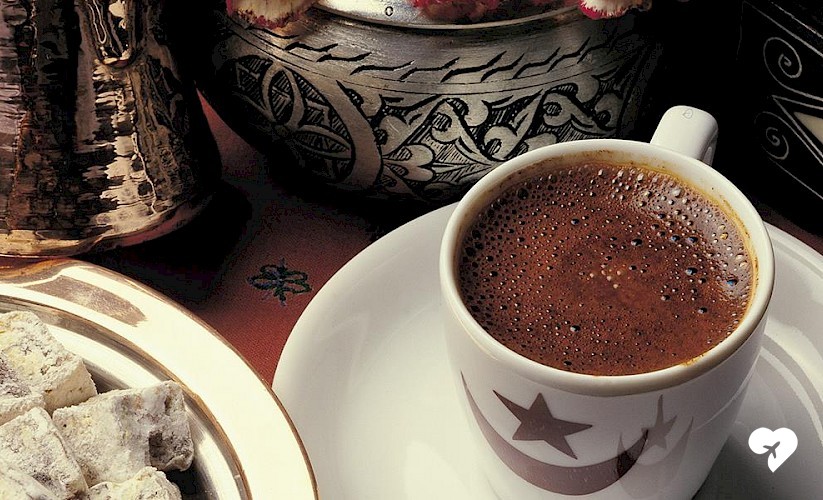Volumes have been written about Turkish coffee; its history, its significance in social life, and the ambiance of the ubiquitous coffee houses.
Without some understanding of this background, it is easy to be disappointed by the tiny brew with the annoying grounds, which an uninitiated traveller (like Mark Twain) may accidentally end up chewing. A few words of caution will have to suffice for the purposes of this brief primer. First, the grounds are not to be swallowed, so sip the coffee gingerly. Secondly, don't expect a caffeine surge with one shot of Turkish coffee; it is not strong, just thick. Third, remember that it is the setting and the company that matter; the coffee is just an excuse for the occasion.
Tea, on the other hand, is the main source of caffeine for the Turks. It is prepared in a special way, by brewing it over boiling water and served in delicate, small, clear glasses to show the deep red colour and to transmit the heat to the hand. Drinking tea is such an essential part of a working day, that any disruption of the constant supply of fresh tea is a sure way to sacrifice productivity.

A park without tea and coffee is inconceivable in Turkey. Thus, every spot with a view has a tea-house or a tea-garden. These places may be under a plain tree overlooking the village or town square, on top of a hill with majestic view of a valley or the sea, by a harbour, in a market, on a roadside with a scenic overview, by a waterfall or in the woods. Among the typical tea-gardens in İstanbul are: the Emirgan on the European side, Çamlıca on the Anatolian side of the Bosphorus, the famous Pierre Loti cafe, and the tea-garden in Üsküdar. But the traditional tea-houses are beginning to disappear from the more tourist-oriented seaside locations, in favor of "pubs" and "Biergartens".
Among the beverages worth mentioning are the excellent fruit juices. But, perhaps the most interesting drink is "boza", traditionally sold in neighbourhood streets by wandering vendors on a winter's night. This is a thick, fermented drink made of wheat berries, to be enjoyed with a dash of cinnamon and a handful of roasted chick-peas. Boza can also be found year-round at certain cafes or dessert shops. And "sahlep", a delicious hot drink made with milk and sahlep powder, is another famous beverage which is a good remedy for sore throats and colds.
 Şerbet / Photo: Gülcan ACAR
Şerbet / Photo: Gülcan ACAR
Sherbet is a group of delicious drinks of the Turkish people. Sugar, honey, rose, various herbs and fresh fruits are all boiled and then water is added to the mixture. It is also served to the guests and neighbours, thereby strengthening the social bonds. Besides being very healthy, this drink arrived in the Italian Cuisine as "sorbetto" over the course of the Ottoman-Venetian relations.
When it comes to alcoholic beverages, "rakı", made of either grapes or raisins, is the aniseflavoured alcoholic drink of Turks. It is often served with seafood or meze particularly at "meyhane". Another taste whose history goes back to very old times across these lands is wine. Many wine types produced from far more grape varieties of the Anatolian lands delight gourmets.
Almost every region of Turkey is home to extensive vineyards where authentic grapes like papazkarası, karasakız, çalkarası, sultaniye, bornova misketi, kalecik karası, emir, narince, öküzgözü, boğazkere, dökülgen, acıkara are cultivated and then fermented to produce original wines that revive even the jaded palates.
